Share
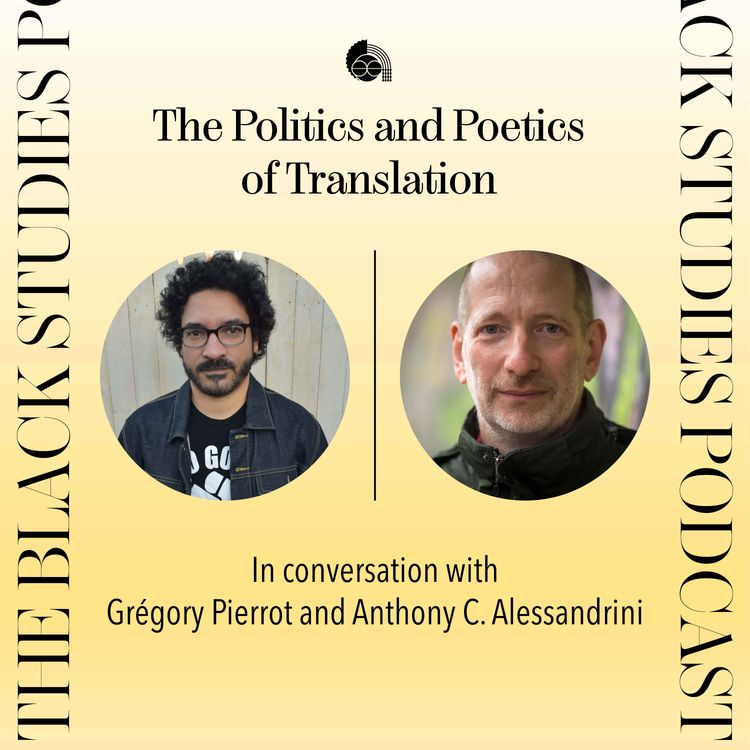
The Black Studies Podcast
The Politics and Poetics of Translation (Part 1)
We are back with a special, two-part episode with Grégory Pierrot and Anthony C. Alessandrini about the politics and poetics of translation and much, much more!
Grégory Pierrot is an Associate Professor of English at the University of Connecticut at Stamford. He is the author of Decolonize Hipsters (OR Books, 2021), The Black Avenger in Atlantic Culture (UGA, 2019) and co-editor of Haitian Revolutionary Fictions: An Anthology (UVA, 2022) and Marcus Rainsford’s An Historical Account of the Black Empire of Hayti (Duke, 2013). He is also a co-host of the webseries Decolonize That!
Anthony C. Alessandrini is a writer and public educator based in New York. He is the author of Frantz Fanon and the Future of Cultural Politics; the editor of Frantz Fanon: Critical Perspectives; and the co-editor of “Resistance Everywhere”. He has also published a poetry chapbook, Children Imitating Cormorants. He teaches English at Kingsborough Community College-CUNY and Middle Eastern Studies at the CUNY Graduate Center, where he is a member of the Committee on Globalization and Social Change. He is also on the faculty of the Brooklyn Institute for Social Research. He is a Co-Editor of Jadaliyya, a Co-Convener of the International Solidarity Action Research Network (ISARN), and an active member of the Palestine solidarity movement.
Some of the work discussed in the first part of this wonderfully rich, stimulating, and wide-ranging conversation:
- Sophia Azeb’s piece on the Pan-African Cultural Festival of 1969 in The Funambulist
- Paul Gilroy’s Against Race
- Cedric J. Robinson: On Racial Capitalism, Black Internationalism, and Cultures of Resistance, edited by H. L. T. Quan.
- Alberto Toscano's "The Long Shadow of Racial Fascism"
- Grégory Pierrot’s Decolonize Hipsters
- Roderick Ferguson’s We Demand: The University and Student Protests
- Angela Davis’s Lectures on Liberation
- Anthony C. Alessandrini, The Lived Experience of Social Construction and Decolonize Multiculturalism
- Chelsea Stieber’s “John Brown Had a Sick Beard”
More episodes
View all episodes
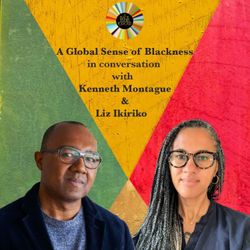
5. A Global Sense of Blackness
57:30||Season 3, Ep. 5In this episode of the Black Studies Podcast, Kenneth Montague and Liz Ikiriko continue their conversation about curating, collecting, and making art in a Black Canadian context. They reflect on the importance of community, the transformative power of art, and the influence of Black cultural workers. They also discuss their collaboration on the book 'As We Rise' and the accompanying vinyl record, which celebrate the diversity and hybridity of Black Canadian identity. The conversation highlights the importance of collaboration, the joy of discovering new music, and the power of art to tell personal stories and create connections.Dr. Kenneth Montagu is a Toronto-based dentist, art collector, and the founding director of Wedge Curatorial Projects, a nonprofit arts organization. Since 1997, Montagu has promoted emerging and established artists via exhibitions, lectures, and workshops. His focus is African Canadian and diasporic art, which he also showcases in his privately owned Wedge collection. Montague's art activities include serving on the African Art Acquisition Committee at Tate Modern in London, UK, and the Photography Curatorial Committee at the Art Gallery of Ontario. He is currently an AGO trustee and an advisor to their Department of Arts of Global Africa and the diaspora.Liz Ikiriko is a Toronto-based Nigerian Canadian artist and curator with over 15 years of experience working with national institutions and artist-run organizations and was a member of the curatorial committee of the 13th edition of VAMACO Encounters, the African Biennial of Photography in Mali. She is currently curator at Gallery TPW and, along with Toleen Touq founded Waveform Projects, a collaboration that studies intimate and relational curatorial practice. She held positions as inaugural curator of collections and art and public space at the Art Museum at the University of Toronto and curator of collections and contemporary art engagement at the Art Gallery of York University. She has published critical texts in Aperture, Public Journal, Sea Magazine, and Black Flash, among others.Chapters01:13 Reflecting on last week's episode and Stuart Hall's work13:06 The Importance of Investigating and Celebrating Black Canadian Identity19:25 Curating and Collecting as Celebrations of Black Canadian Identity21:51 The Collaborative Process of Creating 'As We Rise'44:40 The Power of Music to Inspire and ConnectGuests: Kenneth Montague and Liz IkirikoHosts: Daniel McNeil and Toleen TouqExecutive Producer: Daniel McNeilProducer: Toleen TouqAssociate Producer: Anna Jane McIntyreAudio Engineer: Chancelor MaracleMusic: Marc Mac presents Visioneers, Ike's Mood IArtwork: Anna Jane McIntyreTo find out more, please visit @blackstudiespodcast on Instagram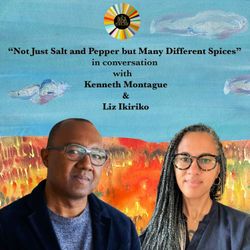
4. "Not Just Salt and Pepper but Many Different Spices"
01:01:37||Season 3, Ep. 4In this episode of the Black Studies Podcast, Kenneth Montague and Liz Ikiriko discuss curating, collecting, and making art in a Black Canadian context. Dr. Kenneth Montagu is a Toronto-based dentist, art collector, and the founding director of Wedge Curatorial Projects, a nonprofit arts organization. Since 1997, Montagu has promoted emerging and established artists via exhibitions, lectures, and workshops. His focus is African Canadian and diasporic art, which he also showcases in his privately owned Wedge collection. Montague's art activities include serving on the African Art Acquisition Committee at Tate Modern in London, UK, and the Photography Curatorial Committee at the Art Gallery of Ontario. He is currently an AGO trustee and an advisor to their Department of Arts of Global Africa and the diaspora.Liz Ikiriko is a Toronto-based Nigerian Canadian artist and curator with over 15 years of experience working with national institutions and artist-run organizations and was a member of the curatorial committee of the 13th edition of VAMACO Encounters, the African Biennial of Photography in Mali. She is currently curator at Gallery TPW and, along with Toleen Touq founded Waveform Projects, a collaboration that studies intimate and relational curatorial practice. She held positions as inaugural curator of collections and art and public space at the Art Museum at the University of Toronto and curator of collections and contemporary art engagement at the Art Gallery of York University. She has published critical texts in Aperture, Public Journal, Sea Magazine, and Black Flash, among others.Chapters03:01 Kenneth Montague: From Dentist to Art Collector04:39 Liz Ikiriko: A Nigerian Canadian Artist and Curator07:33 The Impact of Representation in the Art World10:53 Photography as a World of Possibility19:31 The Continuous Support and Collaboration between Collectors and Curators29:36 Exploring the Diversity of Black Canadian Identity33:00 The Importance of Physical Space and Personal Expression43:08 Cultural Connections and Family Heritage53:12 Art as a Tool for Building Relationships and Supporting Artists56:35 Towards a More Inclusive Understanding of Black Canadian IdentityGuests: Kenneth Montague and Liz IkirikoHosts: Daniel McNeil and Toleen TouqExecutive Producer: Daniel McNeilProducer: Toleen TouqAssociate Producer: Anna Jane McIntyreAudio Engineer: Chancelor MaracleMusic: Marc Mac presents Visioneers, Ike's Mood IArtwork: Anna Jane McIntyreTo find out more, please visit @blackstudiespodcast on InstagramNext Time: A Global Sense of Blackness with Kenneth Montague and Liz Ikiriko
3. Black Canadian Artistry
01:25:05||Season 3, Ep. 3In this episode, Nantali Indongo and Del Cowie discuss journalism, hip hop, Black Canadian artistry, grassroots community hubs, and much more. They reflect on their encounters with each other's work and their experiences in the music industry. They also explore the themes of freedom and liberation in music and the challenges and opportunities of documenting black culture in Canada.Chapters02:53 Encountering Each Other's Work08:13 The Impact of Nomadic Massive13:01 Nantali's Journey to Performance18:19 Del's Musical Background21:29 Convergence of Skills and Passions23:52 Artists Who Move Rights and Liberties Forward27:49 Music as Education for Blackness and Liberation33:30 Challenges and Opportunities in Documenting Black Culture43:01 Expressing Black Experiences and Black Love in Music44:28 The Need for a Distinct Canadian Rap Form52:51 Preserving and Documenting Black History and Culture01:13:00 Hope for the Growing Recognition of Black Canadian ArtistryGuests: Nantali Indongo and Del CowieHosts: Daniel McNeil and Anna Jane McIntyreExecutive Producer: Daniel McNeilProducer: Toleen TouqAssociate Producer: Anna Jane McIntyreAudio Engineer: Chancelor MaracleMusic: Marc Mac presents Visioneers, Ike's Mood IArtwork: Anna Jane McIntyreTo find out more, please visit @blackstudiespodcast on InstagramNext Time: “Not Just Salt and Pepper but Many Different Spices” with Kenneth Montague and Liz Ikiriko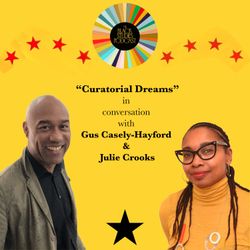
2. Curatorial Dreams
01:13:56||Season 3, Ep. 2In this episode, Gus Casely Hayford and Julie Crooks discuss their transformative work with art institutions, the importance of rediscovering underrepresented artists, finding joy in serving the community, and much more!Chapters01:21 Julie Crooks' Background and Work at the Art Gallery of Ontario03:27 Gus Casely Hayford's Background and Work at V&A East11:00 Fostering Resilience21:41 The Impact of the Black Lives Matter Movement32:29 The Power of Younger Generations33:00 Individual Contributions35:54 Rediscovering Underrepresented Artists37:52 Civic Duty and Public Service38:49 Reflections on Historical Moments and Generational Shifts42:44 The Power of Culture in Society49:37 The 20th Century: Unfulfilled Promises53:15 Musical Inspirations: Beyoncé and Steel PulseGuests: Gus Casely-Hayford & Julie CrooksHosts: Daniel McNeil and Anna Jane McIntyreExecutive Producer: Daniel McNeilProducer: Toleen TouqAssociate Producer: Anna Jane McIntyreAudio Engineer: Chancelor MaracleMusic: Marc Mac presents Visioneers, Ike's Mood IArtwork: Anna Jane McIntyreTo find out more, please visit @blackstudiespodcast on InstagramNext Time: Nantali Indongo and Del Cowie on Black Canadian Artistry
1. "How can I love enough to wake up and find another day?"
01:32:13||Season 3, Ep. 1In this episode, Daniel McNeil and Toleen Touq host a conversation with Sherene Seikaly and Ebony Coletu about the joint struggle of Black and Palestinian liberation movements. They discuss the significance of archiving as a practice of love and resilience, the revolutionary power of curiosity, and the importance of political friendship and collective action. The conversation highlights the need for humility and resilience in approaching archives and asking difficult questions. It also explores the transformational power of archives, the shifting nature of archives when they change location, and the role of friendship in political solidarity. The guests discuss the liberation that comes from shredding archives as a form of resistance against control and how archives can be destroyed or repurposed. They also reflect on the importance of joint struggle rather than mere solidarity and the need to challenge and critique each other in political friendships. The conversation ends with a discussion on grief, the immobility of the current moment, and the practice of sustaining oneself and others in the fight for justice.Chapters 01:27 Archiving as a Practice of Love and Resilience03:45 The Revolutionary Power of Curiosity07:04 Political Friendship and Collective Action13:00 Navigating Complex Historical and Political Contexts45:42 Shredding Archives: Liberation from Control47:09 The Shifting Nature of Archives54:26 Solidarity as Joint Struggle59:38 Challenging Dominant Narratives01:13:23 The Power of Creative Works and Music*The conversation was recorded on Zoom over 3 time zones. We experienced some challenges with the sound quality (especially from 25-28 minutes).Guests: Sherene Seikaly and Ebony ColetuHosts: Daniel McNeil and Toleen TouqExecutive Producer: Daniel McNeilProducer: Toleen TouqAssociate Producer: Anna Jane McIntyreAudio Engineer: Chancelor MaracleMusic: Marc Mac presents Visioneers, Ike's Mood IArtwork: Anna Jane McIntyreTo find out more, please visit @blackstudiespodcast on InstagramNext Time: Curatorial Dreams with Gus Casely-Hayford and Julie Crooks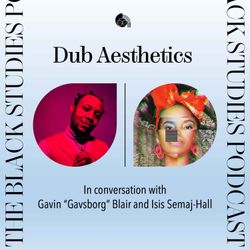
5. Dub Aesthetics
01:13:35||Season 2, Ep. 5In the season finale of the Black Studies podcast, Gavin "Gavsborg" Blair and Isis Semaj-Hall join us to talk about dub aesthetics and the rhythms, sounds, and music that help them to find new forms of belonging with time, space, and each other.Gavin “Gavsborg” Blair is co-founder of Equiknoxx Music, a Kingston-based production and performance collective, with Bobby Blackbird. With roots in Reggae, Hip Hop, Jazz, Dancehall & Ska, the group operates across multiple genres while staying Jamaican to the core. Equiknoxx has released music for Aidonia, Busy Signal, Beenie Man, Ky-Mani Marley, Krayzie Bone, Masicka, J.O.E, Shanique Marie among others. While collaborating with Illum Sphere, Swing Ting, Mark Ernestus, Poirier, Arcade Fire and The Dirty Projectors among others, Equiknoxx continues to be revered for sharing new Jamaican expressions with the world and “making dancehall weird again” (Pitchfork magazine). Dr. Isis Semaj-Hall is the Riddim Writer. She is a literary scholar, decolonial feminist, and cultural analyst with a creative practice that is nurtured by sound. As the Riddim Writer, she creates sound art and hosts the podcast “For Posterity” where she interviews Caribbean writers, musicians, visual artists, and inspiring citizens. As a Caribbean storytelling advocate, she has dubbed poetry and published non-fiction and fiction works. She is also co-founder and editor of the online literary magazine PREE: Caribbean Writing. With a commitment to opening-up access, her cultural analysis and critical scholarship have been published in peer-reviewed academic journals, in non-academic outlets, and can be heard on the 2022 Carnegie Hall produced Afrofuturism podcast. She is currently completing her monograph “On the B-Side: Storytelling Meets Caribbean Futurism in Infinite Dub,” a critical exploration of word-sound-power, deep listening, environmental wisdom, and Caribbean identities. Dr. Semaj-Hall is the Caribbean literature and popular culture specialist in the Department of Literatures in English at the University of the West Indies, Mona Campus in Kingston, Jamaica. Episode Transcript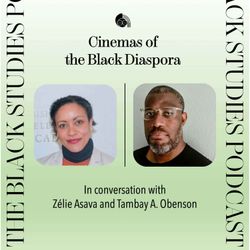
4. Cinemas of the Black Diaspora
01:30:33||Season 2, Ep. 4This week we are thrilled to be joined by Zélie Asava and Tambay A. Obenson to discuss cinemas of the Black diaspora. This conversation explores historically informed and forward-looking approaches to African film; the complexities of global Black communities; writing against the grain of histories and business models that revolve around Hollywood and American cinema; and much, much more! Dr Zélie Asava is a specialist in questions of race, gender, screen studies, and visual culture. She is the author of The Black Irish Onscreen and Mixed Race Cinemas, and co-edited a Special Issue of the Journal of Scandinavian Cinema on black and ethnic minority representation. She sits on the Boards of Screen Ireland, the Irish Film Institute, the journal French Screen Studies, Catalyst International Film Festival and the arts magazine Unapologetic, and is a member of the European Commission’s ‘Capital of Culture’ panel of experts. With over 15 years of experience, Tambay A. Obenson has emerged as a trusted voice in African and diaspora cinema. He founded Shadow and Act in 2009, building what would become the leading online platform for Black film coverage with a global perspective, and spent four years at IndieWire as a Staff Writer. Currently, Tambay is building Akoroko, a new platform focused on mainstreaming coverage of and access to films telling African stories globally. Episode Transcript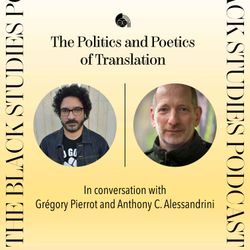
3. The Politics and Poetics of Translation (Part 2)
48:24||Season 2, Ep. 3This is the second part of a wonderfully rich, stimulating, and wide-ranging conversation between Grégory Pierrot and Anthony C. Alessandrini about the politics and poetics of translation, the life and legacy of Frantz Fanon, Black study, decolonial praxis, and much, much more! Some of the books and films discussed in the second part of this fantastic conversation include: Joshua Myer’s On Black Study Jafar Panahi's No BearsIsaac Julien’s Frantz Fanon: Black Skin, White Mask Ousmane Sembène’s Xala Juliano Mer Khamis and Danniel Danniel’s Arna’s Children Episode transcript